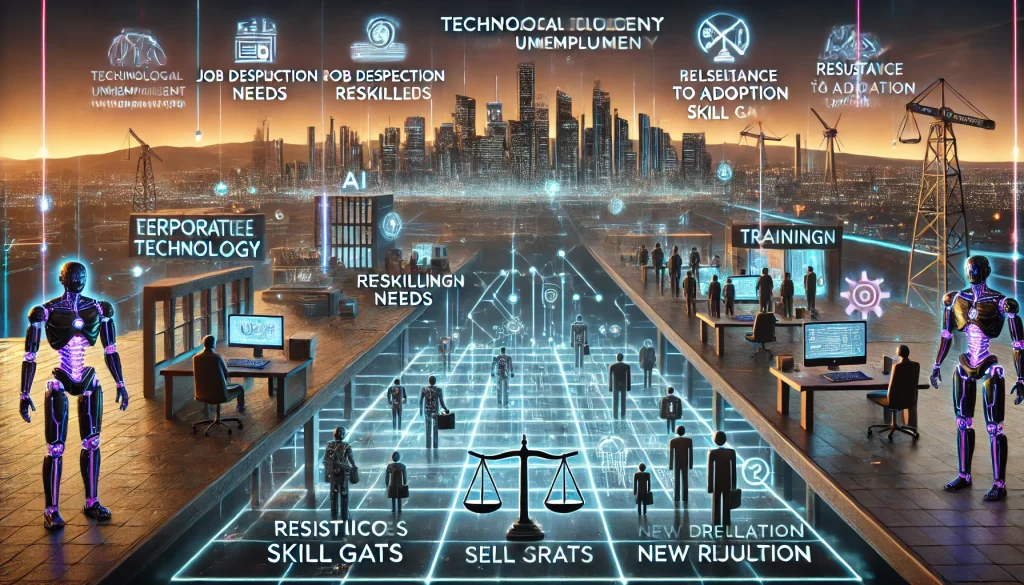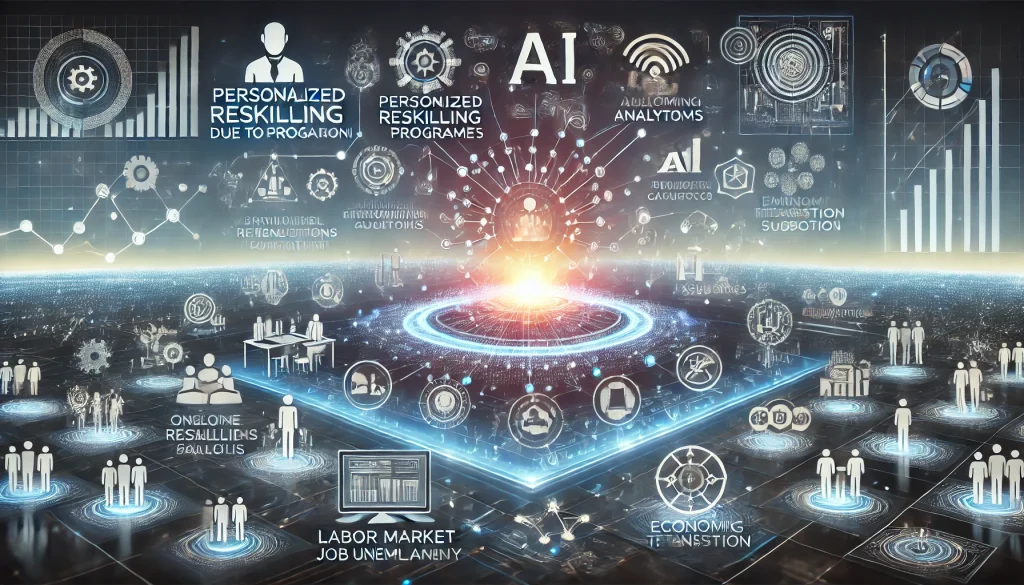Problem Statement
The rise of automation and AI poses the risk of technological unemployment, where jobs are displaced by machines and algorithms. As tech companies develop increasingly advanced AI and automation technologies, they must address the societal impact of these innovations. While automation can lead to increased efficiency and productivity, it also threatens to displace workers, particularly in sectors reliant on routine and manual tasks. The fear of job loss can create resistance to technological adoption, slowing down progress and innovation. Furthermore, the transition to an automated workforce requires substantial reskilling and upskilling efforts to prepare the existing workforce for new roles in the digital economy. Companies must invest in training programs, career development initiatives, and education to ensure that displaced workers can find new employment opportunities. Additionally, there is a need to create new job categories and roles that can coexist with automated systems. Addressing these challenges is essential for maintaining social stability and ensuring that technological advancements contribute positively to society. A dedicated platform that supports job creation, reskilling, and career development can help tech companies mitigate the risks of technological unemployment and foster inclusive growth.
Pain Points
- Job Displacement: Loss of jobs due to automation and AI adoption.
- Reskilling Needs: Urgent need for reskilling and upskilling the workforce.
- Resistance to Adoption: Fear of job loss creating resistance to technological adoption.
- Skill Gaps: Gaps between existing skills and those required for new roles.
- Economic Inequality: Risk of widening economic disparities due to job displacement.
- Social Stability: Potential social unrest due to mass unemployment.
- Education and Training: Need for comprehensive training and education programs.
- Career Development: Lack of career development initiatives for displaced workers.
- New Job Creation: Challenge of creating new job categories and roles.
- Policy and Regulation: Navigating policies and regulations related to employment and automation.

Future Vision
Our platform envisions a future where automation and AI contribute to job creation and economic growth, rather than displacement and inequality. By leveraging advanced technologies such as AI and machine learning, the platform will provide personalized reskilling and upskilling programs tailored to individual needs and market demands. These programs will include online courses, virtual workshops, and hands-on training opportunities to equip workers with the skills needed for new roles in the digital economy. The platform will also support job creation by identifying emerging job categories and facilitating the development of new roles that complement automated systems. Real-time labor market analytics will help companies understand skill demand and supply dynamics, enabling them to make informed decisions about workforce development. Additionally, the platform will offer career development tools, such as mentorship programs, career counseling, and job matching services, to support displaced workers in finding new employment opportunities. By fostering collaboration between tech companies, educational institutions, and policymakers, our platform will create a sustainable ecosystem that promotes inclusive growth and ensures that technological advancements benefit all members of society.
Use Cases
- Personalized Reskilling Programs: AI-driven programs tailored to individual needs and market demands.
- Online Courses and Workshops: Comprehensive training opportunities in emerging technologies.
- Labor Market Analytics: Real-time insights into skill demand and supply dynamics.
- Career Development Tools: Mentorship programs, career counseling, and job matching services.
- Emerging Job Categories: Identification and development of new job roles that complement automation.
- Collaboration Platforms: Facilitating collaboration between tech companies, educational institutions, and policymakers.
- Employee Transition Support: Tools and resources to support workers transitioning to new roles.
- Regulatory Compliance: Ensuring compliance with policies and regulations related to employment and automation.
- Economic Impact Analysis: Assessing the economic impact of automation on different sectors.
- Community Engagement: Engaging communities in discussions about the future of work and technology.
Target Users and Stakeholders
- User: HR Managers, Training and Development Teams, and Tech Executives
- Age Group: 30-60 years
- Gender: M/F
- Usage Pattern: Regular usage for managing reskilling programs, workforce development, and career transition support
- Benefit: Enhanced workforce readiness, reduced unemployment, and inclusive growth
- Stakeholders:
- Tech Companies: Businesses adopting AI and automation technologies
- Educational Institutions: Schools and universities offering training programs
- Government Agencies: Policymakers overseeing employment and automation regulations
- Workers: Individuals impacted by job displacement and seeking new employment opportunities
- Non-Profit Organizations: Entities advocating for workforce development and economic equality
Key Competition
- Coursera: Provides online courses and reskilling programs in various fields.
- Udacity: Offers nanodegree programs and vocational training in emerging technologies.
- LinkedIn Learning: Online learning platform with courses on business, technology, and creative skills.
- Skillshare: Community-based learning platform offering a wide range of courses.
- General Assembly: Provides immersive training programs in tech, data, and business.
Products/Services
- Coursera Reskilling Programs: Online courses and certifications in emerging technologies.
- Udacity Nanodegree Programs: Vocational training and project-based learning.
- LinkedIn Learning: Online courses on various professional skills.
- Skillshare Classes: Community-driven learning platform with diverse courses.
- General Assembly Bootcamps: Immersive training programs in tech and business skills.
Active Startups
- Degreed: Platform for lifelong learning and skill development.
- Guild Education: Provides education benefits for working adults.
- Springboard: Offers online courses and mentorship in tech fields.
- Thinkful: Provides online coding bootcamps and career support.
- Scaler: Offers training and placement services for software engineers.
- Pathstream: Partners with universities to offer tech-focused career programs.
- Go1: Corporate training platform offering diverse learning content.
- Pluralsight: Technology skills platform with a focus on IT and software development.
- MasterClass: Online classes taught by industry experts.
- FutureLearn: Offers online courses from leading universities and organizations.
Ongoing Work in Related Areas
- AI and Machine Learning: Enhancing personalized learning and reskilling programs.
- Data Analytics: Improving labor market insights and workforce development strategies.
- Virtual Reality (VR): Developing immersive training experiences for skill development.
- Blockchain: Securing and verifying educational credentials and certifications.
- EdTech: Innovating in educational technology to support lifelong learning.
Recent Investment
- Degreed: $153M in Series D funding led by Sapphire Ventures, October 2020.
- Guild Education: $150M in Series E funding led by Bessemer Venture Partners, November 2020.
- Springboard: $31M in Series B funding led by Telstra Ventures, December 2020.
- Thinkful: Acquired by Chegg for $80M, October 2019.
- Scaler: $20M in Series A funding led by Sequoia India, January 2021.
Market Maturity
The market for platforms addressing technological unemployment and workforce reskilling is maturing rapidly. Established companies like Coursera, Udacity, LinkedIn Learning, Skillshare, and General Assembly offer comprehensive reskilling programs and career development services, while innovative startups like Degreed, Guild Education, and Springboard are pushing the boundaries with personalized learning and mentorship. Significant investments in AI, data analytics, and educational technology are transforming the industry, enabling more effective and efficient workforce development strategies. As the market continues to evolve, we expect to see more integrated and advanced platforms that provide end-to-end support for job creation, reskilling, and career development, ensuring that tech companies can address the societal impact of their innovations and contribute to inclusive economic growth.
Summary
The rise of automation and AI poses the risk of technological unemployment, where jobs are displaced by machines and algorithms. Tech companies must address the societal impact of their innovations, ensuring that they contribute to job creation and reskilling opportunities. Our proposed platform leverages AI, data analytics, and educational technology to provide comprehensive solutions for workforce reskilling and job creation. Key pain points include job displacement, reskilling needs, resistance to adoption, skill gaps, economic inequality, social stability, education and training, career development, new job creation, and policy and regulation.
Target users include HR managers, training and development teams, and tech executives, with stakeholders encompassing tech companies, educational institutions, government agencies, workers, and non-profit organizations. Key competitors like Coursera, Udacity, LinkedIn Learning, Skillshare, and General Assembly offer various reskilling programs and career development services. Active startups such as Degreed, Guild Education, Springboard, Thinkful, and Scaler are driving innovation in this space. Recent investments highlight significant interest and growth potential in platforms addressing technological unemployment and workforce reskilling.
By addressing these challenges and leveraging advanced technologies, our platform aims to balance innovation and employment, fostering inclusive growth and ensuring that technological advancements benefit all members of society.
